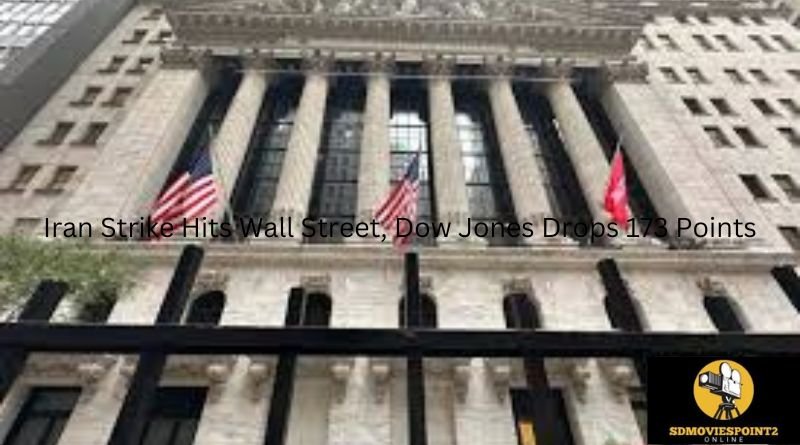The recent military strike involving Iran has sent shockwaves through global markets, with Wall Street taking a significant hit. The Dow Jones Industrial Average plummeted by 173 points, reflecting investors’ concerns over geopolitical tensions and their potential impact on the economy. In this article, we will delve into the details of the Iran strike, its implications for Wall Street, and how such events shape financial markets.
Understanding the Context of the Iran Strike
The backdrop to the Iran strike is complex, rooted in a long history of geopolitical tensions in the Middle East. Iran’s role in regional conflicts, its nuclear ambitions, and the intricate web of alliances and enmities have created an environment of uncertainty. The recent escalation is a culmination of various factors, including economic sanctions, military provocations, and diplomatic failures. The global community watches closely as the situation unfolds, knowing that any misstep could lead to significant consequences.
The strike itself was a targeted military operation, intended to achieve specific strategic objectives. However, such actions often have unintended repercussions. In this case, the strike was met with a swift response from various actors in the region, further escalating tensions and leading to fears of retaliation. Investors, already skittish due to ongoing economic uncertainties, reacted quickly to the news, leading to the sharp decline in the Dow Jones.
Market Reaction to Geopolitical Tensions
Investors’ reactions to geopolitical events are often visceral. The initial reports of the Iran strike led to a flurry of trading activity, with many investors opting to sell off their holdings in response to the potential for increased instability. Stocks in sectors particularly sensitive to geopolitical events—such as energy, defense, and technology—were hit hardest. The oil market also experienced volatility, with prices spiking as fears of supply disruptions emerged.
The broader implications of such strikes extend beyond immediate market reactions. Historical trends show that periods of heightened geopolitical tension often lead to increased volatility in financial markets. This volatility can create both risks and opportunities for investors. Those with a keen eye for market movements may find ways to capitalize on the fluctuations, while others may adopt a more cautious approach, seeking to protect their investments during uncertain times.
The Impact on Investor Sentiment
Investor sentiment plays a crucial role in shaping market dynamics. Following the Iran strike, sentiment took a noticeable dip, reflecting a broader anxiety about the implications of the event. Economic indicators, corporate earnings reports, and global trade considerations often influence investor confidence, but geopolitical events can overshadow these factors.
As fear and uncertainty loom, investors tend to gravitate towards safer assets. This flight to safety can drive up the prices of government bonds and gold, as investors seek to shield their portfolios from potential losses. The recent volatility on Wall Street underscores the importance of maintaining a diversified portfolio and having a well-defined risk management strategy in place.
Long-Term Considerations: Economic Fallout
The long-term economic implications of the Iran strike are still unfolding. Experts warn that if tensions escalate further, we could see a significant impact on global trade, energy prices, and investor confidence. Economic sanctions imposed on Iran have already disrupted trade flows, and further escalation could exacerbate these issues.
Moreover, the interconnectedness of the global economy means that disruptions in one region can have ripple effects worldwide. The energy sector, in particular, is highly sensitive to geopolitical tensions. Fluctuations in oil prices can lead to higher transportation costs, impacting consumer prices and overall economic growth.
Analyzing the Broader Economic Landscape
While the immediate focus is on the Iran strike, it is essential to analyze this event in the context of broader economic trends. The U.S. economy has been grappling with various challenges, including inflation, supply chain disruptions, and labor shortages. The combination of these factors with geopolitical tensions creates a complex environment for policymakers and investors alike.
The Federal Reserve’s monetary policy decisions will be closely monitored in the coming weeks, as they navigate the delicate balance between supporting economic growth and curbing inflation. The potential for increased geopolitical risks may complicate these decisions, leading to further uncertainty in financial markets.
Conclusion: Navigating Uncertainty in Financial Markets
In conclusion, the recent Iran strike has significant implications for Wall Street, as reflected in the Dow Jones’s drop of 173 points. Geopolitical tensions can create volatility in financial markets, affecting investor sentiment and long-term economic prospects. As the situation develops, investors must stay informed and be prepared to adapt their strategies to navigate the uncertainty.
Understanding the interconnected nature of global events and financial markets is crucial for making informed investment decisions. The Iran strike serves as a reminder of the unpredictable nature of geopolitics and its potential impact on economic stability. By maintaining a diversified portfolio and staying attuned to market trends, investors can better position themselves to weather the storms of uncertainty that lie ahead.
Read also: check




